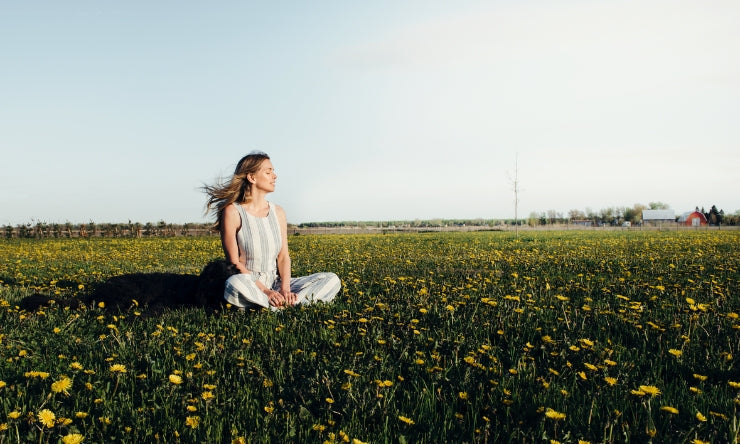Meditation is now widely recognized for its benefits on stress, anxiety and concentration . But did you know that certain essential oils can enhance its effects by promoting mental calm, grounding and connection to oneself ? Thanks to Due to their biochemical richness and their direct action on the limbic system , essential oils used in olfaction during meditation become true allies for refocusing and deepening one's practice.
In this article , I invite you to discover how to meditate with oils essential thanks to this to three simple and effective synergies . That you be beginner Or passionate , these synergies will will allow to integrate easily aromatherapy to your moments of meditation , for a ritual sensory and deep .
Why combine essential oils and meditation?
The Power of Olfaction in Mindfulness
Olfaction is one of the most powerful senses to influence our emotions and our inner state . When an essential oil is inhaled , its aromatic molecules quickly reach the brain via the olfactory nerve, directly stimulating the limbic system , the center of emotions , memory and mood . This rapid and profound interaction makes essential oils an effective tool to accompany meditation .
By inhaling essential oils before or during a mindfulness session , you create a signal sensory immediate relief that promotes relaxation , concentration and self - awareness . Some oils promote mental calm, others support anchoring or spiritual connection. By choosing appropriate essences , it becomes easier to let go of parasitic thoughts and enter a deep meditative state .
A sensory ritual to deepen your meditative practice
Incorporating essential oils into your meditation ritual creates a soothing, grounding routine . The familiar scent of an olfactory synergy becomes a reassuring landmark , an anchor that guides you toward an inner state of calm . With repetition , a simple breath becomes a trigger for refocusing and serenity .
This sensory ritual also acts on motivation: it becomes easier to settle down to meditate when we find the pleasant smell of an essential oil associated with a moment of well- being . Whether you practice seated meditation , conscious breathing or guided relaxation , essential oils reinforce the experience and prolong its effects.
4 Essential Oils for Deep Meditation
Frankincense: The Essential Oil of Spiritual Elevation
Frankincense essential oil is rich in monoterpenes , known for their calming and balancing effects on the autonomic nervous system. It also has a mild anti - inflammatory and respiratory regenerating action , which facilitates deep breathing during meditation .
Emotional benefits:
Traditionally used in religious rituals and spiritual practices, Frankincense essential oil promotes introspection , meditation and a feeling of inner unity . It helps you gain perspective, let go of the mind and connect with a more subtle dimension of yourself.
Practical advice:
Add 2 to 3 drops of Frankincense to an essential oil diffuser 10 minutes before your session to create a conducive sacred atmosphere . to concentration and letting go .
Precautions:
Prohibited for pregnant women under 3 months - Prohibited for children under 6 years old - Dilute before application to the skin - Not recommended for people suffering from respiratory allergies or asthma .
Atlas Cedar: the essential oil of grounding and stability
Atlas Cedar essential oil contains mainly sesquiterpenes , which act on the central nervous system with a mild sedative , stabilizing and comforting effect .
Emotional benefits:
Atlas Cedarwood is an ideal oil for those who have difficulty settling down or calming a restless mind . It promotes grounding , inner strength and emotional stability , and helps one stay centered even in times of mental turbulence.
Practical advice:
Place 1 drop of Cedarwood on a tissue and breathe deeply three times before beginning a mindfulness meditation .
Precautions:
Not recommended for pregnant or breastfeeding women. Do not use for long periods without professional advice . Avoid use in children under 6 years old.
Myrrh: the essential oil of inner silence
Myrrh is composed mainly of sesquiterpenes , which have sedative , anti - inflammatory and calming properties . Its action is slow but profound on the nervous system .
Emotional benefits:
In meditation , the essential oil of Myrrh facilitates mental calming , inner withdrawal and deep peace. It helps dissolve mental tensions and reconnect with a space of benevolent silence.
Practical advice:
Add 1 drop of myrrh to an inhaler stick or inhale it directly from the bottle cap to accompany a short session of silent meditation .
Precautions:
Prohibited for pregnant and breastfeeding women - Prohibited for children under 6 years old - Dilute before applying to the skin - Use occasionally.
Davana: the essential oil of heart opening
Uncommon , Davana essential oil contains ketones and esters , which give it emotionally balancing and harmonizing properties .
Emotional benefits:
There Davana is ideal for meditative practices focused on self - acceptance, inner tenderness , and emotional release . It soothes blockages related to sadness or self - judgment , and supports the heart chakra .
Practical advice:
Dilute 1 drop of Davana in 5 ml of jojoba vegetable oil and apply gently to the solar plexus or wrists before meditating .
Precautions:
Prohibited for pregnant and breastfeeding women - Prohibited for children under 6 years old - Dilute before application to the skin - Not recommended for people with epilepsy .
Recipes for meditation and refocusing
“Sacred Presence” Broadcast
This diffusion allows you to create a sacred , favorable atmosphere to meditation guided , prayer or introspection .
Recipe :
-
3 drops of Frankincense essential oil
-
2 drops of Myrrh
-
1 drop of Davana
Use :
Diffuse this synergy (following the instructions for your device) for 10 to 15 minutes before the session , in a well - ventilated room . You can also diffuse it for a few minutes at the beginning of the practice to set the intention .
Desired effect:
Calming of the mind, feeling of unity , support for spiritual connection.
Olfaction “Roots and Sky”
This direct olfaction allows you to quickly refocus and regain inner stability , particularly in the case of agitated thoughts .
Recipe :
-
2 drops of Atlas Cedar
-
1 drop of Incense
-
1 drop of Myrrh
Use :
Place the oils on the wick of a personal inhaler stick, or on a tissue. Inhale deeply through the nose 3 times slowly before beginning your meditation or during a centering session during the day .
Desired effect:
Grounding , inner calm , reduction of mental ruminations.
Peaceful Heart App
This application helps to soothe the heart , welcome emotions , and promote gentle relaxation before evening meditation or deep relaxation .
Recipe for 5 ml roll-on:
-
1 drop of Davana
-
1 drop of Myrrh
-
1 drop of Incense
-
Complete with jojoba vegetable oil
Use :
Apply to wrists, solar plexus or behind ears , 5 minutes before meditation . Breathe in the scent deeply before settling in .
Desired effect:
Relaxation emotional , opening of the heart , inner gentleness .
Additional tip:
These synergies can also be associates to a positive intention or affirmation , thus reinforcing the olfactory anchoring effect . For example, breathe in the synergy while mentally repeating : “ I am calm , centered , present . ”
General precautions for the use of essential oils
To take full advantage of these synergies, follow these tips:
Specific precautions for broadcasting: Do not diffuse for more than 30 minutes per session to avoid saturating the air. Use a diffuser that is appropriate for the size of your room.
Dilution: Dilute essential oils before skin application to avoid irritation.
Tolerance test: Before use, carry out a skin tolerance test by applying a small amount of essential oil diluted in vegetable oil to the inside of the elbow and wait 24 hours to check for an allergic reaction.
Do not use in children, pregnant or breastfeeding women without medical advice: It is imperative to consult the essential oils sheet and consult a health professional before any use in these specific cases.
Precautions in case of pathologies: People with chronic illnesses (asthma, epilepsy, hypertension, etc.) should consult their doctor before using essential oils, as some may have adverse effects or be contraindicated with their treatment. Your doctor is the only primary player in your health.
Beware of photosensitizing oils: Some essential oils, such as citrus oils (lemon, bergamot, grapefruit), can cause skin burns or spots if exposed to the sun after application. Do not use them before direct sun exposure.
Avoid mucous membranes and eyes: Essential oils can cause severe irritation. In case of accidental contact, rinse thoroughly with a carrier oil, not water. Consult your doctor.
To conclude ...
Combining essential oils with your meditation practice is much more than just a wellness gesture . Thanks to Due to their biochemical richness and their action on the limbic system , certain essences such as Frankincense , Myrrh , Atlas Cedar or Davana become powerful allies for refocusing , calming the mind and opening a space of inner silence .
In diffusion, olfaction or cutaneous application , each synergy of essential oils for meditation allows you to install a personalized olfactory ritual , both sensory and emotionally comforting . These aromatic anchors , repeated regularly , reinforce the quality of your presence and facilitate access to a deeper and more lasting meditative state .
Whether you are new to aromatherapy or already Passionate , these simple practices will guide you toward a more stable inner balance , more conscious breathing, and a more intimate connection with yourself . Incorporating essential oils into your meditation ritual is bringing nature into the heart of your silence.
References
Books:
-
Sensory approaches in aromatherapy – Michel Faucon – Dunod Editions, 2023
-
Olfactotherapy: Smell to feel better – Gilles Fournil – Éditions Amarys, 2012
Maison Jacynthe disclaims all liability. All information contained on this page is not intended to replace justified allopathic treatment, nor to disregard the expertise of the medical profession. It is up to each individual to take charge of their own health, to inform themselves, and to make the necessary changes to improve their condition. Therapeutic supervision by a qualified health professional is obviously recommended.





































































Leave a comment